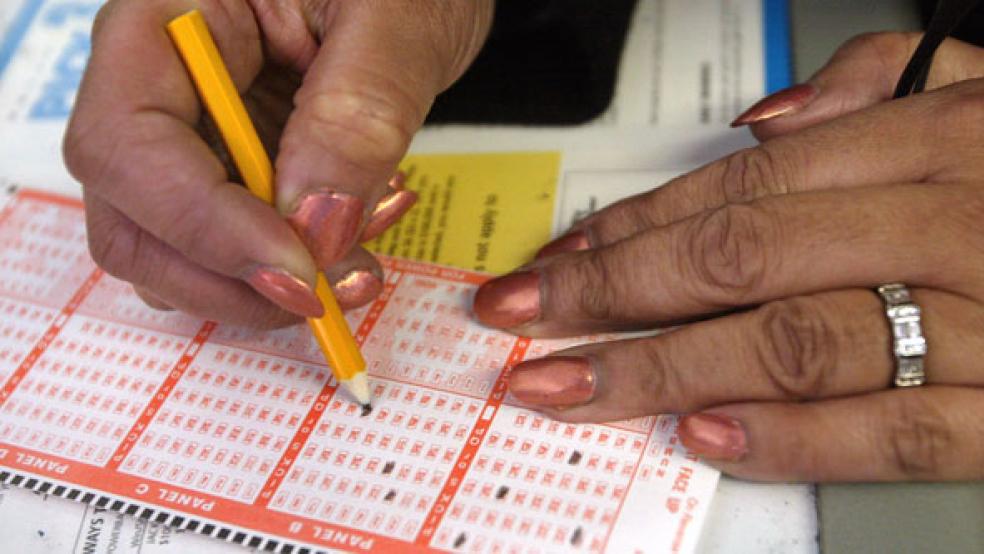The record-breaking $1.4 billion Powerball jackpot was inevitable. The Multi-State Lottery Association, which runs the Powerball lottery, had changed the odds of getting all of the matching Powerball numbers in the fall from about one in 175 million to one in 292.2 million. It’s now less likely that players will win the jackpot, but there’s a higher probability of winning a smaller prize (from one in 32 to one in 25).
That change put the odds of a billion-dollar lottery over a five-year period at 63.4 percent of the time, according to calculations from FiveThirtyEight. Under the previous odds, a billion-dollar lottery only had an 8.5 percent chance over a five-year period.
Related: New Powerball Rules Make It Harder to Win Big
The decision to shake up the odds resulted from disappointing ticket sales that plagued the lottery since 2013, the last year of a massive jackpot. Last year sales fell nationally by 19 percent. In New York, Powerball sales plunged 44 percent, by $217 million. Lottery officials were hoping that with the change, there’d be more billion-dollar lotteries that would drum up excitement and sales.
And they bet right. With the nation’s largest lottery jackpot ever, people have been lining up to purchase tickets in the hopes of choosing the winning ticket. If you’re eagerly waiting for the next set of numbers to come out on Wednesday night, below are some other Powerball numbers to keep in mind.
$868 million: The “cash value” jackpot that Powerball will award the winner if s/he decides to receive the lump sum. This is before state taxes, though.
$604.5: The amount the Powerball winner will receive after deducting 25 percent federal tax, but before any state taxes. The federal tax removes $201.5 million.
10: The number of states, including Puerto Rico and the U.S. Virgin Islands, that don’t charge any state taxes on lottery winnings. These are California, Delaware, Florida, New Hampshire, Pennsylvania, South Dakota, Tennessee, Texas, Washington and Wyoming.
$502.2 million: The paltry amount that a New York City resident would take home if s/he won the jackpot, thanks to NY having the highest tax among participating states (8.82 percent) along with the city’s municipal tax (3.9 percent).
44: The number of states that participate in Powerball, including Washington D.C., Puerto Rico and the U.S. Virgin Islands
1/292,200,000: The odds of winning the jackpot in Wednesday night’s drawing. This means there are 292.2 million possible combinations of the five white balls and red Powerball.
Related: Don’t Be Too Jealous of That Powerball Winner
28: The odds of winning the jackpot are equivalent to flipping a coin 28 times and receiving a heads each time. Doesn’t sound so difficult? Give it a try.
25: An American is about 25 times more likely to become to next president of the U.S. than win the jackpot
1/11,700,000: The odds of winning the second prize of $1 million that goes to players who get all the right numbers except for the Powerball
$999 million: The jackpot amount that’s advertised on billboards across the country because they’re not built to show billions
$40 million: The amount the current jackpot started at on Nov. 7
$7,700/one second: The pace at which tickets were being sold on Saturday afternoon before the $949.8 million drawing. That’s almost $28 million per hour.
70: The percentage of past winners that used computer-generated numbers from a system called Quick Picks.
Related: Wealth Managers Claim $254 Million Powerball Jackpot
16: The number of winning tickets purchased in Pennsylvania over the past 13 years, making it the most common state or U.S. territory to win Powerball in. Indiana comes in second with 11 winning tickets.
8, 54, 14, 39, 13: The most frequently drawn numbers in Powerball.
$656 million: The previous record-holding U.S. lottery jackpot that Mega Millions paid out on March 30, 2012 – less than half of the $1.3 billion jackpot up for grabs now
$590.5 million: The largest previous Powerball jackpot in May 2013.
$2.4 billion: The amount that the world’s largest lottery, Spain’s El Gordo lottery, “The Fat One,” paid out in cash prizes in December. But, the grand prizes were capped at about $4.36 million per winning ticket.
6: The number of states where lottery winners can remain anonymous, including Delaware, Kansas, Maryland, North Dakota, Ohio and South Carolina.
44: The percentage of past lottery winners who spent their entire winnings within five years.





